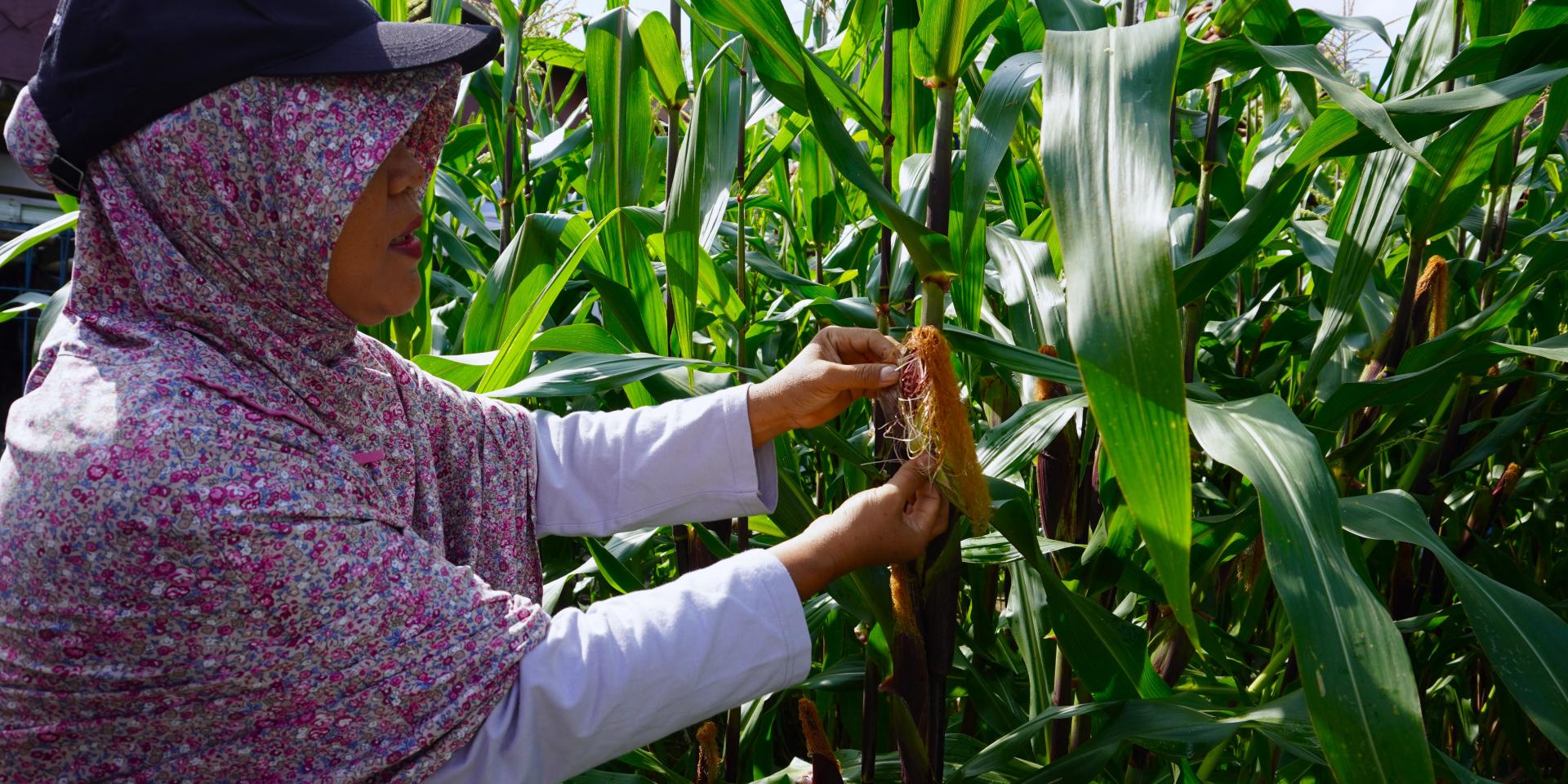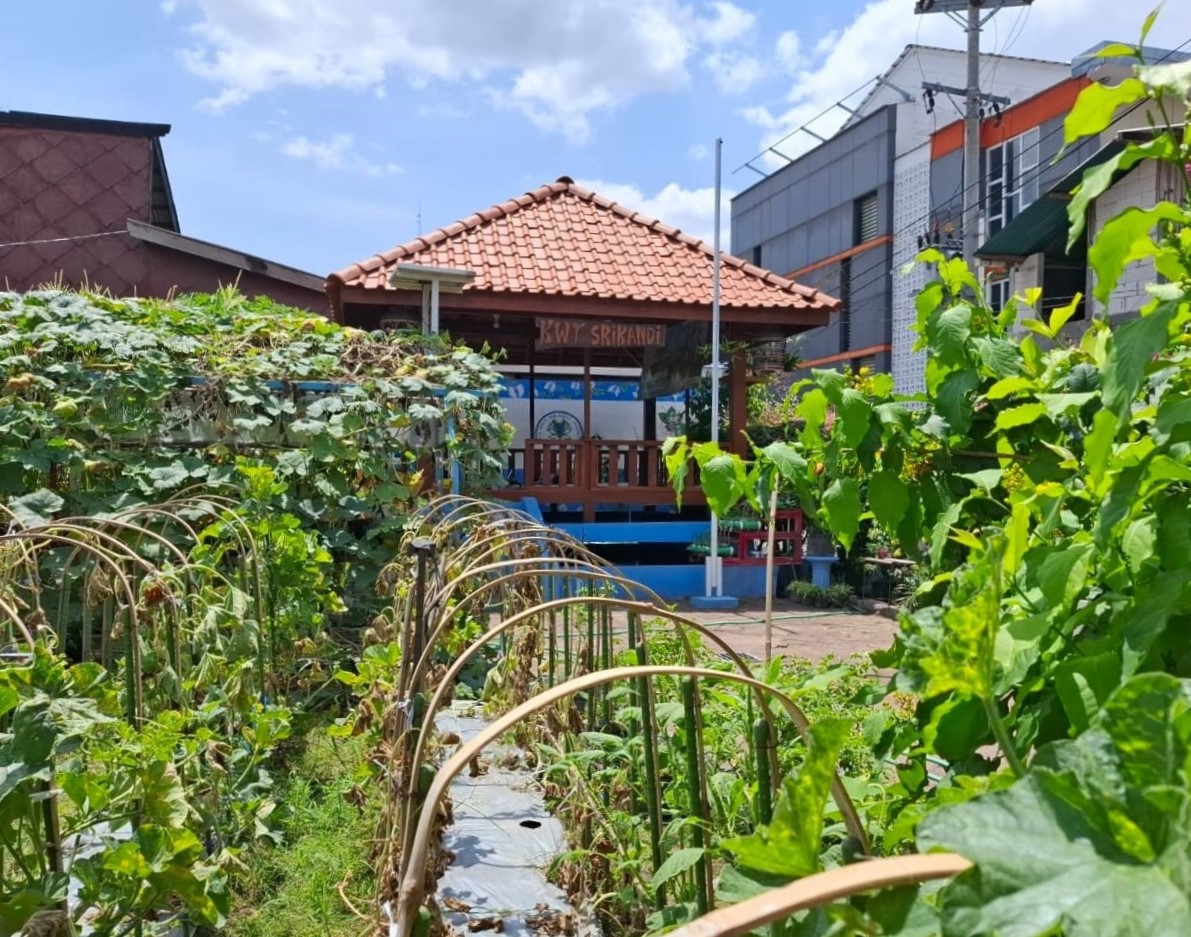Harvesting Hope: Improving Livelihoods through Urban Farming
 Photo: Tri Selasa / IRRI
Photo: Tri Selasa / IRRI
This blog post was authored by Tri Selasa Pagianti as part of the CGIAR GENDER Impact Platform training on telling stories about agricultural solutions that work for women. This training took place online between September and December 2024. This story was first published by AGRILINKS, and is reposted in full below.
Women farmers in Yogyakarta, Indonesia face challenges from limited resources, tools, and knowledge on how to maximize harvest from their urban farming plots of vegetables and fruits.
However, a community development program initiated by a local bank branch is helping women overcome these barriers by creating sustainable urban farming ecosystems in densely populated urban areas. This program has been implemented in 21 locations across different regions in Indonesia. The program provides them with: agricultural tools; support on developing demonstration plots; support to install solar cells; and training in urban farming management.
One of the farmers involved, Nur Handayani, said the project had significantly helped them: “Through this urban farming activity, we can get locally sourced vegetables and fruits to meet local household needs and we can save up to 150.000–200.000 rupiahs ($10-$13) per month.”
The Bank Rakyat Indonesia (BRI) program for women also provides members of women’s farmer groups with easier access to capital loans.
The initiative is further supported by local government, Kalurahan Caturtunggal, and the Agriculture Department of Sleman Regency, who conduct training for women on producing food and drink, marketing products, and agricultural practices.
Women farmers are usually joined in a group or union, which in Indonesia is called Kelompok Wanita Tani or KWT: women’s farmer group. Nur Handayani, the leader of KWT Srikandi, said their farmer group faced challenges with resources and knowledge before this support.
“We used to only share fresh produce or give it away, but now we create value-added products like soups, snacks, crisps, drinks, and sambal, selling them locally and at exhibition events,” she said.
“From product marketing training, we learned to package these products more attractively and properly, and we now even cater for local government events.”
“The demonstration plot helps us to showcase the urban farming activities we do, motivating local people to try it at home and educating children what vegetables and fruit trees look like and where vegetables and fruits they eat come from.”
Yuni Kurniawati, a staff member of the Community Development and Empowerment Department at Kalurahan Caturtunggal, said:
“The government aims to always be present, offer support, and assist the community in its growth. When the community prospers, our region will naturally prosper as well.”
BRI's Deputy Director, Catur Budi Harto, said that the project provided ongoing training aimed at maintaining the sustainability of plants and the surrounding ecosystem:
“The target of this program is densely populated areas and slum settlements that have local environmental activists ('local heroes') who are members of groups such as women's farmer groups (KWT) or other women’s groups.”
Nur Handayani said the benefits of the project go beyond achieving economic outcomes for women:
“Joining KWT, I also can see personal growth of the members. Aside from farming, they also learn how to present themselves in front of important people in the government, and they are also more confident now to speak up and participate in a discussion forum.”
Another member of KWT, Sarinten, agrees with Nur: “Becoming a member of KWT gives me lots of physical, mental, and economic benefits. I have many friends, and I socialize with them. I gain a lot of new and exciting knowledge like making organic fertilizer and producing ready-to-serve food. I can now get fresh vegetables and fruits direct from the farm which can save my expense on food.”

KWT Srikandi’s demonstration plot, located in the middle of a densely populated urban area.
However, participating in KWT’s training also benefits non-members. Yuni Lestari, a PKK (Pemberdayaan dan Kesejahteraan Keluarga) worker whose job focuses on children’s education, explains:
“I participated in a few trainings from KWT Srikandi, like making organic fertilizer at home and cooking. I understood what they taught me, but did not practice it because I’m not a stay-home wife. My spouse stays at home. So, I taught the cooking lesson to my spouse because he’s the one who cooks at home.”
Key to the project’s success was the collaboration between government, private sector, and the KWT women’s farmer group. The government and private sector asked KWT Srikandi first what they needed to see if they could accommodate it through their plan and program. Local government, Kalurahan Caturtunggal, and the Agriculture Department of Sleman Regency, all saw the potential to incorporate the training needs of all KWTs into their long-term program.
By addressing their needs, local governments and BRI continue to support women farmers in creating sustainable urban farming ecosystems.